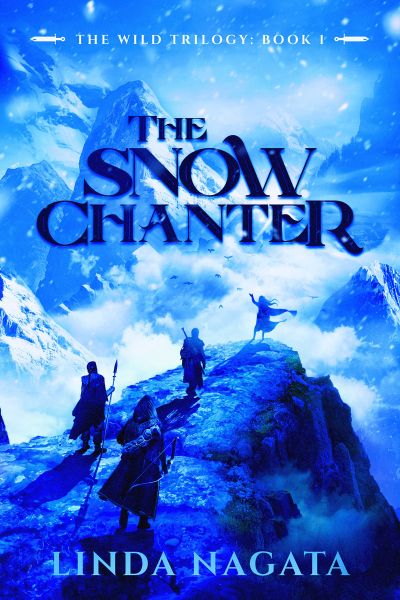Whispering Winds
The Snow Chanter (The Wild, volume 1)
By Linda Nagata

22 Apr, 2021
2020’sThe Snow Chanter is the first volume in Linda Nagata’s new trilogy, The Wild.
Humans were a novelty in the Wild, where they began replacing the once-pristine forests and fields with farms, villages, and cities. Many Inyomere, the nature spirits of the Wild, hated the changes but were unsure how best to deal with the humans. One Inyomere, Siddél, embodiment of storm, was more decisive. It was clear that humans must be exterminated. To this end, he created the monstrous arowl, monsters who run in packs and (he hopes) will rid the Wild of humans.
Thus the start of the Long War, which has been going on for centuries. Many humans have died, but they haven’t been exterminated. There are still humans in the Wild. Not exactly prospering, but surviving.
One day, Bennek, a young Samokean man, is summoned to a quest.
Long ago, the Inyomere Tayeraisa, called the Snow Chanter by humans, took a human man as her husband. The Samokeans are descended from the forty-one children of Tayeraisa. Thanks to their Inyomere heritage, many of Clan Samoket have supernatural gifts: Bennek, for example can send his soul out to roam. Better yet, he can befuddle and evade the arowl.
The Snow Chanter vanished ages ago (why she did and where she went are still mysteries). Over time her descendants’ magical gifts have been diluted, to such an extent that generations ago Siddél managed to drive them out of Samoket, their home in the Wild, But it’s not finished. An Inyomere in the form of an owl visits three Samokean orphans – Bennek, Kit, and Marshall — and urges them to return to their homeland. Great glory awaits them!
Of course the three teens go.
The quest nearly ends prematurely when the three are attacked by a pack of arowl. They are saved by a woman armed with fire magic. She claims that she’s Lanyon of the Kyramanthes clan. Which is odd, since her clan died out long ago.
There’s a simple explanation: Lanyon stepped through time, from her era to the current one. She won’t explain how she did this and why she did it. To explain is to expose an ancient shame. But not to expose it may endanger the natural order.
~oOo~
This is a significant change of pace for Nagata. Rather than her usual hard science fiction, this is mythic fantasy1 told in a very formal prose. It is fantasy in which young people think nothing of walking to another land, there to face of legions of monsters, hoping to free a god. The only reward? Glory.
On the one hand, what pluck! On the other hand, it’s a good thing birth rates are high in this setting, because otherwise demographic implosion would arrive swiftly.
Although the novel in some ways recalls McKillip or Swann’s fantasies from the 1970s (both authors have been reviewed here), there is one significant difference, which is to say, this is very much book one of three. This is the volume that lays out the setting and sets up the conflicts — the obvious conflict with Siddél and another (quite possibly more important one) I will leave as a surprise. There’s just enough plot to qualify as a novel, as well as plot hooks galore, which should entice readers to buy the future volumes.
The fact the book isn’t standalone might be cause for concern, given how many ambitious series have faltered long before their conclusion. The reader might ask “Is this another [series title redacted lest I offend a Big Name Author], or [series title redacted lest I offend a Big Name Author], or even [series title redacted lest I offend a Big Name Author], authors whose last installments came out in the Obama, Clinton, or Nixon administrations?” Fear not, for all three books are finished and will no doubt each get their reviews here.
The Snow Chanter is available here (Amazon US), here (Amazon Canada), and here (Amazon UK). I did not find this at Barnes & Noble, Book Depository, or Chapters-Indigo.
1: How convenient that this comes along as I poke here and there in Stafford’s Glorantha. This is a very Runequestian fantasy, right down to the fact that sudden death is always a very real possibility.
